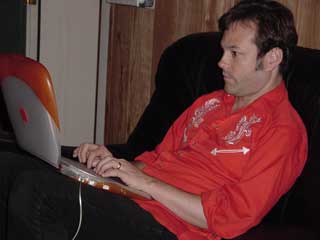August 31, 2003
That's not Hi-Cool, that's Genocide!
On the general theory that it is as well to know which tunes the devil is playing, I usually pick up a copy of the New Statesman each time I visit England. (I used to read it more often on line, but since they instituted a pay-per-view system for all on line content, I've always ended up deciding that there are better ways to spend my allowance. For the price of a single NS article, you can get half a pint of lager in London, for instance: a much better deal, if you ask me.)
Sadly, the 1 September issue is pretty much a snooze. No Pilger. No Neil Clark. Nothing from Andrew Stephen except a virtual puff piece on Arnold Schwarzenegger. No discernible flirtation with anti-Semitism, even. (Really.) There's a vague "George Bush's Global Warming Will Kill Us All" theme. We find the usual surly, but more or less half-hearted, slaps at America, Americans, liberals, "neoliberals", The Rich, globalists, et al. running through its pages, but only rarely rising to what I'd call true New Statesman Hysteria. A silly yet tepid bit of scare quote-laden hair-splitting Mugabe revisionism is probably the most New Statesmanlike piece of the bunch, the familiar, bitter, sarcastic rhetoric, in the context, almost evoking nostalgia: "Robert Mugabe-- horrid, horrid HORRID Mugabe." (The point of the article-review being, I believe, that while Mugabe may well be horrid, we need to put the horridness in the proper context and that capitals and italics go too far. There are loads of "tyrants" [punctuation sic] just as horrid: why pick on him? Now that's what I call Classic New Statesman.)
All in all, though, the New Statesmen appear to be a shadow of their former selves. It's rather sad. I was a bit surprised at all the yuppie-ish, almost Bridget Jones-flavored, "lifestyle" content, on wine, Food, Travel, ice cream, and so forth. Maybe that has always been a feature, but I'd never noticed it before. Flipping idly through the back pages while waiting around for something or other, I had the distinct impression that I'd picked up someone's discarded United Airlines in-flight magazine by mistake.
I did quite enjoy, however, the piece by Dan Rosenheck on the politics of air conditioning. Or rather, I suppose I should say, "the American cultural construct of air conditioning." In fact, Rosenheck himself adopts a reserved, wry (rather than bitter) tone attempting to limn the repugnant "culture of comfort" that makes air conditioning so inexplicably popular in America. Still, it's pretty clear that his sympathies lie with the characteristic (and in light of recent events, ominous) European "why can't they just open a window?" attitude. (I don't suppose anyone who has travelled through AC-free Europe in the summer would disagree that Europeans seem to value comfort a bit less than we do. Many of us find this charming as well as curious and inconvenient. However, last month when I was in Tuscon, where it was 114 degrees in the shade, I did try opening a window once, just for the hell of it. Let's just say I'll never do that again.)
The article itself, however, for me, is a mere framing device for a couple choice quotes from what appears to be an entire anti-air conditioning book by one Marsha Ackermann. (Cool Comfort: America's Romance with Air Conditioning.) "[Americans] don't think about when they need to use air conditioning and when they don't," she says. "They don't think about other values in their lives." Guilty as charged, I suppose. I'm all about the AC as anyone who knows me knows.
If you like your culture clash rhetoric sardonic and dripping with scorn (I do), Ackermann is your woman. Here's my fave:
"[Suburbanites] thought of the home as a refuge from all kinds of unpleasant outside forces, like racial issues and the big bad city versus the pleasant suburban countryside... Escape from heat became part of this idea that the home was safe from these nasty forces which would weaken the US and make it vulnerable to conquest by its enemies.
It takes a real pro to construe air conditioning as form of racism. If the New Statesman wants to recapture a bit of the old fire, they could do worse than hiring Ackermann as their regular air conditioning correspondent.
August 29, 2003
Ethnography
The other day, two five-year-old boys were sitting on stone steps near the Russell Square park. I didn't catch what they were talking about, but I did hear one of them demand, with feeling and in that fuzzy, Damien Omen II voice such children usually have, "well, why on earth not?" This particular phrase is something you'd never hear from an American, young or old, needless to say. It's hard to say why I find this sort of thing so charming, but I do.
People over here are always parodying the ubiquitous American tourist's manner of speaking. "Aw, gee, honey! Isn't that cute?" And they talk among themselves derisively about how, to an American, everything is "quaint", or "sweet", or "cute", or "darling." They have a point, of course, but so do we: most everything over here is quaint as hell, and speech patterns are as big a part of it as old-world architecture, elegantly crumbling infrastructure, or the widespread use of the romantic technology of yesteryear. I once stayed in a Slaughtered Lamb-style bed and breakfast somewhere in the north of England where, upon checking in, you were given a hand towel, a tiny bar of soap, and a big black rock. In response to a quizzical look, the dour, doughty proprietress said "don't be daft. It's yer coal, innit, my lover? For the heating." Great scenery, rustic ambiance, a matronly hobbit, a nearly unintelligible version of English, and a nice, big lump of coal. Just like in the olden days. Aw, gee, honey! Ain't that the cutest thing you ever did see?
Londoners fancy that they're a bit more cosmopolitan, modern, and less quaint than such country bumpkins (whom they also constantly ridicule) and by and large they have a point. But here's where they're wrong about it: no matter how fancy and up-to-date their "mobiles" may be, and no matter how many times they say things like "wha' a loud o' bloody bollocks," to visitors from the States, they always somehow end up coming off like a bizarre, unlikely, and in the end irresistibly adorable amalgam of Bertie Wooster and Samwise Gamgee unsuccessfully attempting to say "name is Michael Caine." And to be perfectly honest, even in London, a fair few of them seem like well more than 50% hobbit. It's very sweet.
"I'm so sorry, most awfully sorry," said the fashionably-dressed young lady in the pub the other night, "but would you possibly by any chance very much mind telling me what sort of time it is? At all?" It was just past 10:30. "Oh, lovely! Lovely! Oh! Lovely! Thank you ever so much!" she says on her way out. Like I'd offered to donate a kidney to her dying brother or something. My wife, a British girl who has been living in America just long enough to acquire the distance to recognize quaintness where it occurs (but who is still known to exclaim "blimey!" on occasion, to my great amusement), said "don't you just love England?" Of course I must say I should have thought it fairly obvious, as it were, that one would do. Love it, I mean to say. Gosh! Beggin' yer pardon and meanin' no disrespect, but blimey, my woman! Wha' a loud o' bloody bollocks, innit? Cuppa tea, Gandalf?
Fervent apologies and extravagant expressions of gratitude for trivia are just about the only occasions where British people seem comfortable and unembarrassed by overt demonstrations of emotion-- if "emotion" is the right word for what is really (I think) mostly a histrionic application of some mysterious standard of formal civility. I'm not sure if you'd use "emotion" for the heavy, gloomy, resigned "we're all doomed and there's no point" manner that most Brits seem to affect around 80% of the time: within every man, woman, child, banker, Queen, beggar, glamour girl, or bus conductor, there seems to lurk an inner Morrissey that doesn't have much trouble taking hold of the host organism in most circumstances. Other than that, though, the Brits have the unique ability to be embarrassed by just about everything. And I'm sure the tendency towards an extreme daintiness of expression (even among those who imagine themselves to be "rough") has to do with the need to create embarrassment-repellent distance in a city where everyone is always bumping into and standing on top of one another.
Sometimes, particularly when it comes to those in the service industry and low-level figures of authority like bank managers or airline administrators, the wordy over-the-top faux-politeness and a well-developed skill with the subjunctive mood serve in combination to mask, rather ineffectively in my view, the truth that they, as they might say themselves, "don't really give a toss" about you or any trouble you might be having. You know the kind of thing I mean: "I'm afraid I must tell you that I'm most frightfully sorry, and I imagine the information might, at the very least, be rather unwelcome, not to say just a bit frustrating, and were I in such a position myself, I should, I imagine, feel most dreadfully, awfully, put out and all that, but as I say, it is my rather less than enjoyable duty as a representative of this institution to inform you that, as one might have imagined in the circumstances, yet clearly, though you might have done, in the event for some reason you have not, in fact, done-- as I say, I'm awfully, frightfully, most terribly sorry to have to tell you that, unfortunately, by the time I have finished this sentence, you will have missed your flight entirely, and there's not a thing you or I will be able to do about it. Ah, as I suspected, there it went. Hard luck. I'm sure I don't know to whom you might speak to "rectify the situation" as you put it: my job is passenger delay. In any event, good morning." Tosser.
So it may take me awhile to get there, but my train for Norwich (where the hobbit-o-meter often goes up to eleven) leaves at two. See ya.
August 28, 2003
Intercontintental Ballistic Mixing
The original plan had been to have final mixes for every song by the end of last week, reserving one day before mastering to fix little things after having mulled it over. That would have involved a solid week of round-the-clock cocooning in our cave/studio, which is how mixing usually is done on projects like this. The danger is that you can lose perspective and make mistakes before you have a chance to realize that they are mistakes, while the advantage is that you can get swept up in the momentum, perform superhuman feats of endurance, and occasionally, in the giddy, sleep-deprived wee hours, accidentally stumble upon a crazy, brilliant idea that never would have occurred to you (or that you wouldn't have dared to try) and which ends up being your favorite thing that "makes the album" for you. Plus, that's just the most efficient way to use time that's charged by the day. In this particular situation, it would have been nice to have everything finished before my trip to England, so that I could take some time off from the record, listen through the pre-mastered mixes and approach the final fix-it day with some distance and the proper perspective.
That's not how it turned out, however. For one reason and another, and a few others as well, the mixing never quite got off the ground at the planned pace. There were various delays, glitches, and what not. Kevin had been working on the basic sound, as I've explained before, in preparation for my coming in and helping to alter, shape and reorient these so that they come out the way they're supposed to. But that never ended up happening. My only real involvement in the in-studio mixing had been to listen to the songs in their current state for a couple of hours, around mid-week. It was disorienting and confusing, and I really didn't know what to make of any of it. But time kept on slipping, slipping, slipping into the future. In the end, I left for London carrying not a CD of allegedly finished mixes as planned, but rather a CD of rough, half-finished tracks.
All the sounds are great. (My only worry in that regard is whether there should be more of them.) We did such a complete, coherent job in the tracking, and were, I suppose, so well-prepared and "on the same page" with the sounds, that most of the changes I want are more arranging issues than sonic ones, which is very unusual. None of the mixes are complete, though a few are close. Some are still missing important parts. Some of the parts that are there are wildly out of balance, at least as I envisioned them. Basically, Kevin just threw what we had so far on to a CD. It sounds different every time I listen to it. It is, as am I, a big mess. But I can discern the outlines of the songs as they are truly intended to be, in some cases actually a bit better than they probably had any right to be; if we don't blow it too much, it's going to be great.
Kevin's going to continue working while I'm gone, and I'm supposed to listen to the CD, make notes, and email them to him. Which is exactly what I've been doing, obsessively and voluminously. (I'm sure if I had easy access to a high-speed connection here-- not all that common in Great Britain-- we'd be swapping sound files over the net as well. We did a lot of that sort of thing during the preproduction demo-ing process, particularly among those Sacramento boys.) He'll get a head start working on the songs with the comments in mind, and we'll really get to work on finishing it all up when I get back home. We have till Sept. 16, which is the mastering date, and we'll keep going till time, money or the engineer/studio owner's patience runs out, whichever comes first.
All told, I'd say I've sent around ten full pages of notes and comments so far, with much more to come. Here's an excerpt of one of these emails, just to show you the kind of thing I'm talking about:
I really want to go to town with the faux Beatles-esqueness on the bridge. It should come as more or less a complete surprise, and sound like something from the Abbey Road "pop symphony" with Black Sabbath inexplicably having turned up as the back up band for a 15 second mini-song. Or something like that. The vox should be huge and overwhelming and lush, especially on the line "Peace Forever." The final chord of the bridge (formed by the vocals, the two ebows and all the guitars), i.e., the word "now," should hang over the end of the phrase and decay as the drum fill begins. The two tracks of single-note electric guitar (occasionally referred to as the "George guitar") at the end should basically be the lead instrument, but all should be audible. Basically, it should sound like we've segued into a completely different song; then zoom back to the original after the drum fill.
This long-distance mixing feels weird, and it is quite unique in my recording experience, but in the end this the project will benefit from this change in plan. Having more time to think about things is always a help (unless you drive yourself insane-- which could well happen.)
It's a given that things sound different out of the studio, and that the entire thing will sound different after it has gone through the mastering process. It sounds different depending on where you stand in the room, in fact. Part of the challenge of mixing is to try to allow for this, to correct for such things and come up with a final mix that will sound right in different circumstances. As with all sound recording, everything in this regard is an approximation, a balance, a compromise-- you try to arrive at the most effective balance that covers as many bases as you can think of. There are certain things you have to train yourself to ignore when examining your mix and tweaking the arrangement. For instance, you usually want to mix the drums much louder than you want them to be on the final product, because the compression in the mastering process usually makes them sound quieter. Listening that way can make the whole thing sound off-kilter, which is confusing, but you just have to learn to pretend that the drums are in the right place while you try to tinker with the arrangement and the mix. One of the things we learned immediately from listening to the roughs is that the combination of these sounds, these songs, these arrangements, these effects, and the equipment and format we're using has had the following result: the effects (particularly vocal effects) sound way more pronounced in the studio than out of it. I was alarmed to discover that my CD sounds quite a bit dryer than what we were hearing in the studio, almost like the effects weren't even there. We're going to have to correct for this, pushing the effects higher in the studio so that they will be audible and do what they're supposed to outside. (As I say, this sort of thing is a given, but this time around it was just a little more extreme than predicted.) We would have noticed this under the original plan, but it might not have been quite as dramatic a contrast and we might not have had much time to fool around with it (and to devote enough individual attention to it as it occurs in different form from track to track) on the single final pre-mastering day.
I may be going out on a limb here, but I also think the album, in the end, might turn out to have benefited from the distance as such. It's an unintended variation on what has become a sort of theme of this studio journal: the difficulty of describing sounds with words, and the effect that the myriad, necessarily unsatisfactory attempts to do so anyway can have on the ultimate result. Doing so much writing during this recording has forced me, encouraged me, and enabled me to be far more articulate than I've ever been about the sorts of sounds I want. That changes nothing about the essential situation in re: sounds you hear in your head being untranslatable. But the exercise has promoted more focus, greater clarity, on my part. I feel I understand the songs, the tracks, the recording, the unborn album far better than I would had I ventured into the studio blog-less. And there's certainly a similar phenomenon at play as I write my detailed, song by song, verse by verse essays on what goes where, what should sound like what, and what seems to be missing. If things had gone according to plan and custom, I'd never have had the occasion to write such a thing, never had the occasion to try to think about how to describe these sounds in declarative sentences, and probably would not have understood everything nearly as well or in anything like the same way. I'll say one thing: goofy as it sounds, I'm probably going to try to write little essays on the rough mixes next time, even if I happen to be in the same room as the engineer and even if I no longer have a blog. It's a pain, but it's also a help.
August 27, 2003
My London
So here I am in London. It's been over a year since I was last here, but I've spent a great deal of time here over the years. The little corner of London where I've always stayed (and where I am now) is in Camden between Russell Square and King's Cross. Like everywhere in London, and much of the rest of Britain, it is quaint and picturesque, except where it is squalid. You could put a photo of the facade of our building on a postcard, and write "look Ma, old world charm" on it with no trace of sarcasm. But Cambria House across the street is now bombed out, burned out and boarded up. And right across the street from our flat and the grand, leafy park (formerly a churchyard which still contains the graves of various 17th century luminaries) is the concrete, vaguely totalitarian Brunswick Center, the ugliest building I have ever seen in a lifetime of shying away from hideous architecture. It's like a little piece of the Soviet Union, ca. 1968, preserved forever in the heart of London's picturesque and historic Bloomsbury locale.
Not much has changed around here in the last couple of years. The old camera store has become a Middle Eastern restaurant. Different storefronts at the Brunswick Center have been boarded up, while other previously boarded-up ones have been re-inhabited by new fly-by-night, likely doomed business ventures. I miss the Char Bar ("You've Had Your Tea! Why Not Have it at HOME!") which offered "beigells" on their menu.
The saddest thing is that Britain's most determined, most single-minded, though perhaps not its most gifted, satirist appears to have finally thrown in the towel.
Here's what I'm talking about: the British Museum is constantly under construction. Along one of the iron fences on one side of its grounds, there is a plywood, construction-site structure, essentially a false wall. It was intended to be temporary, no doubt, but it has now been there for at least eight years. I doubt they have any plans to take it down. They have painted it green, and seem to spend a bit of money "keeping it up."
Part of the green plywood beautification program is a printed poster that reads "Bill posters will be prosecuted." The first time I noticed it (and here's where the determined satirist comes in) someone had written "BILL POSTERS IS INNOCENT" underneath the text. On my way back home, the poster had been removed and replaced with a new one. The next morning, the graffito was back; the next afternoon, the poster had once again been replaced. And thus began a pas-de-deux that lasted several years. Society's rebel never tired of the joke (which is pretty good, as such things go, but in which those of us with less focus might have lost interest after the first couple of years); and the authorities were similarly tireless and determined in their remedial maintenance. At some point, they started putting the poster in a frame with a plexiglass face. The BILL POSTERS IS INNOCENT guy wrote his signature phrase in sharpie, or sometimes scratched it into the plastic with a key. Whatever method he chose, the authorities would simply replace the glass, time and time again. The materials and methods changed over time, but not the essential process. A tale old as time, really. I always admired what I imagined to be this fellow's selfless dedication to keeping his joke alive, through the greatest adversity, when lesser men would long ago have abandoned the project. They don't often make them like that.
That was then, however, and this is now, and the BILL POSTERS IS INNOCENT guy appears no longer to be in action. It's sad. The authorities won this one, comrades, I'm afraid.
(And, I need hardly add, the wall is usually covered from top to bottom with posted bills. Of course it is.)
August 22, 2003
Partially Obscured by Paranoia
Hey, I really appreciate the latest wave of "eight little songs" orders. (I guess it was spurred by the Lookout site and maybe a bit by the Lileks link.) I'm going to mail out all orders I receive through the end of today on my way to the airport on Saturday; after that, though, you'll have to wait around till I return from England on Sept. 6. Anything that comes in during that time will be sent out immediately on my return. Sorry for the inconvenience, but I just can't think of a realistic way to do it from overseas.
If you're local, you could stop by the show at the Gaslighter in Campbell CA tonight-- they're only 5 bucks when you get them in person.
I've got a studio update coming, if I end up having the time to finish writing it. No matter how well prepared you are, or how well you do, it usually ends up getting complicated and weird and confusing around this time, and this is no exception. I can see around four or five radically different directions the finished product might go, some coldly realistic, some quite clearly based on the worst kind of paranoid/neurotic distortion, some that seem to span both categories if such a thing is possible. I can (I think) rank them in order of preference (I really hope we manage to avoid four and five.) But at this point I'm not totally sure what's going to happen. It's strange how you can work on something pretty constantly for, like, three years and, once the smoke clears, still not really be clear on exactly what it is you've got standing before you. I usually end up poking it with a stick till it's almost all holes; then wallow in regret forever thereafter. Of course, the smoke never really clears all that much, and right now, there seems to be smoke everywhere. More later.
August 21, 2003
A Twilight of Vague Extremes II
Once you enter the studio, you rarely, if ever, come out again. But on those surreal occasions when you do, it looks like this:

August 19, 2003
There he is, Miss America
I can't vouch for the integrity of the methodology, but at least some of the people have spoken on this important matter. I would like to thank my parents, God and Ayn Rand...
Holy Jumpin' Catfish
Wow, an Insta-lanche and a Lileks-wave all in the same twenty-four hour period. Traffic has quadrupled (at least.) Thanks, fellows.
Master of the Blogosphere Lileks has posted a couple of techno-samply songs he cooked up on his mac. Check 'em out-- they're quite cool. It appears he and Soundtrack spit them out on a Saturday evening while the rest of the family was out shopping at the Mall of America. (Life is so much simpler and less expensive without drums-- it almost seems as though the music generates itself, the product of pure thought, no fancy mics or engineering expertise required. Sigh...) I prefer the Chickenheart Doom Mix, for pretty much the same reason Layne does.
If you're one of Lileks's zillions of readers, my mp3s are over there on the right: "Institutionalized Misogyny", and "Democracy, Whisky, Sexy".
A Twilight of Vague Extremes
This is probably the strangest time in the gestation period of an album: where the tracking trail-off elides into the initial technical, set-up part of the mixing. Usually, I'm there for every single, tedious, repetitive, mind-numbing second (which I vaguely enjoy, when I'm not feeling vaguely suicidal-- I'm a man of vague extremes.) This time, though, scheduling and technical complications meant that we got off to a bit of a rolling start. We decided that the most efficient way to go, once the set-up was pretty complete, was for Kevin Army to get basic mixes of everything without "artist interference"; once that's done, I'm supposed to start interfering, making sure the arrangements are right, all the parts are there, etc. Arguing about this, that, and the other.
So there have now been two full days of mixing without my involvement (other than a couple of brief phone consultations.) It feels very strange.
The raw tracks are all pretty together sounding, and Kevin says it's sounding great. But there are, of course, many different approaches to take. This is another instance, perhaps the most important one, where understanding plays a role in how the record comes out. And understanding can be elusive, hard to come by. I've tried to communicate my "vision" of each song, via home-made demos, and during the tracking, and through many, many intense and often hilarious discussions and arguments about the arrangements and sounds I wanted to get. But if this studio journal experiment shows anything, it's that such things are extremely hard to communicate.
In many cases, I'm pretty sure we're on the same page, but you never totally know for sure. There will inevitably be cases where there will be discrepancies between my view and Kevin's, between the intention and what's achievable given what we have to work with, and, most maddeningly, little aesthetic judgments where leaving something off solves some other problem-- what if one of the "producers" thinks that the thing to be left off is trivial, while for the other it "makes the song"? To use an example I've already outlined in detail, there is a major-7th vocal harmony on the song "Elizabeth or Fight!" that is pretty crucial in my view; the issue got a little obscured by the other argument about the minor-9th harmony in another bit when we were doing the back-ups, and I have no idea whether (a) I was really able to communicate how important it was and (b) whether what ended up on tape (sung by me in the face of seeming incomprehension from everyone else in the control room) is good enough or effective enough to be as prominent as I might like it to be. We'll probably have another argument about the minor-9th, and I'm willing to give some ground on that, but I'm going to have to insist on the major-7th, even if it means re-doing the part, which will take some time.
We'll be able to revise stuff like this, of course. (We'll find out just how much is in contention when I finally go in.) The nagging worry in the back of one's mind is that, in the end, and if there's a lot, there won't be enough time to revisit everything, and we'll just have to "live with" some things that are (for me) less than perfect. But it's preferable to wasting a lot of time arguing from song one, as we have to end up with something more or less release-able by the end of the week. (We've got that show in Campbell, CA on Friday night, and I leave for England the following day. I think there's still room in the budget for one more fix-it session when I return before the mastering, but obviously we want to come as close to finished as possible.) Having a basic mix to start with in every case will be a big time-saver, in the end. And, of course, I could be quite wrong about some of this stuff. And I'm extremely pig headed. Sigh.
The most daunting thing, though, isn't the fact that I may have to argue for my arrangements or this or that little aspect of them, but that in order to get everything to come out as I wish I've got to remember all this stuff. I've taken some notes, but not nearly enough. (Plus I doubt if I can remember where I put most of the notes. Note to self: use a single notebook next time. Other note to self: put first note in a safe, obvious location.) It's mostly down to my leaky brain, under pressure of time, and in the face of an unavoidable Sounds Good Let's Move On ethos. And I'm just a bit frazzled at the moment.
I believe today is the day, though, and I'll let you know what happens. I have no earthly idea, though high hopes, as to how it will go.
August 17, 2003
I was a mod before you was a mod
I never knew about the Anti-Modulation Movement till a few days ago. If I had known, I'm pretty sure I would have made certain that the arrangements on the new album included a good handful of extreme, final chorus step-ups. Just for spite, because I'm that way.
As it happens, though, and to my horror, I realize that there is not a single final chorus, full-step modulation among the new songs. There's one that has some pretty extreme, abrupt key changes in and around the bridge; and one which commits the alleged sin of making the V chord minor for a stretch (I don't think there's a website about that one yet, though I could be wrong.) For the most part, though , the key changes/migrations are a subtle, evolutionary affair that I doubt the anti-modulation crowd would even notice. Damn.
August 16, 2003
Good Advice without a Prayer
Richard Bennett clearly and ably explains the basics of the various "machines" in California politics. He's dead right here:
The Repubs can either use this election to reincarnate their party into relevance, or to finish it off altogether. If the Republican Party is to have a future here, it has to be recast from the Pat Robertson mold into the image of the Silicon Valley Republican (AKA "RINO") embodied by Tom Campbell, Richard Riordan, and Arnie: that's libertarian on social issues, pro-choice, tough on crime, strong on education, and tight on taxes. Pete Wilson understands this, and if the California Reeps can turn this corner, they could start a movement that goes nationwide. In his day, Reagan was socially liberal: he signed the first no-fault divorce law in the nation, after all. Today it means live-and-let-live with gays and legal immigrants, hands-off abortion, and some sort of wimpy gun control. So the future of the Republic rides on this wacky recall, after all.
Of course, this is nothing more than good, common sense; in other words, extremely unlikely.
UPDATE: Apropos of this, Francis W. Porretto left this comment over at Bill Quick's place:
The sensible approach to this, from the GOP's perspective, would be to enforce party discipline and unite its efforts behind the candidate with the best chance of winning California. However, that requires something conservatives have managed only rarely: the suppression of internal squabbling and some hard swallowing over policy and ideological divergences.Of course, there's not even the slightest room for doubt as to who the "best chance" guy is: it's hard to imagine any realistic scenario where McClintock or Bill "watch me lose again" Simon manage to beat Bustamante, though I suppose anything's possible. Of course, the idea of McC or Simon "taking one for team" is out of some parallel universe as well.Dubya should get Schwarzenegger, McClintock and Simon into a little room and tell them approximately this:
"You're not leaving here until two of you have withdrawn from the governor's race. I don't much care which of you stays in it. However, I do care that you present a united face to the state of California. There are fifty-one electoral votes and seats in Congress at stake. If your hypertrophied egos mess up the party's best chance to win those votes and seats since Reagan was governor, I will personally see to it that neither of you ever receives one more groat of support from the party for as long as you live, regardless of what it costs me..."
Would Dubya ever do that? No. He's too soft-spoken, and too willing to believe the best of people. IMNSHO, Simon and McClintock are displaying their Dark Sides just now, and need to be spanked -- but if the president can't bring himself to discipline or dismiss State Department subordinates for working against his Middle Eastern policy, there's scant chance he'll brandish his birch switch for the sake of California.
August 15, 2003
Studio Random-ness
Kevin and I changing the things we can change, accepting the things we can't, etc.:
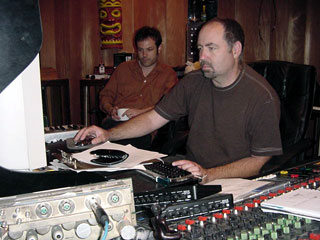
All the amp talk has alarmed at least one correspondent, who is a bit concerned that the guitar sound is going to be "all Alcatrazed-out."
In fact, it's not going to sound like any of our previous records-- that's the intention, anyway. We did use a couple of Vox AC30s quite a lot (it's one of the best-sounding amps there is, and Ted's is one of the best of them I've heard); a Silvertone; an improvised Fender-AC30 "Frankenstein" hybrid; no Fender Bassman or Matchless this time, but some of the home-recorded tracks that may end up in the mix were played through a Mesa Boogie Mark IV. Yet, in the interests of helping little Tommy sleep a little easier, allow me to demonstrate that quite a bit of it was done with my beat up old JCM 800:

Nailing the Clams
I'm still intending, as I mentioned before, to write a little essay on the bizarre superstitious habits and tics singers use to so as to avoid jinxing the vocal recording process. I've never met a singer who isn't at least a little obsessive-compulsive. Over the years, you acquire layer upon layer of such "lattice-work" (to borrow a term from Operators and Things.) Eventually, if you're not careful, you end up having to deck yourself out like some kind of Hills Have Eyes medicine man or orc shaman. I'm well aware that there are drugs you can take for this kind of thing.
Anyway, I've already mentioned my newest one, the "magic vocal glasses". From now on, I will have to wear them every time I try to do a vocal track.
I'm not up to writing the whole essay now, but here are a couple of other pieces of paraphernalia that, for some reason, have come to play a role in the vocal recording process: framed Robyn Hitchcock autograph, and weird green figurine of Chinese man.
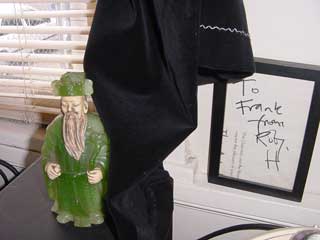
On another vocal-related note, here's the lyric "sheet" for one of the songs. I don't know how other folks do it, but I always provide Kevin with a typed, double-spaced lyric print-out that he uses as a kind of "score" so he can follow along, know where he is, and take notes on where to punch:
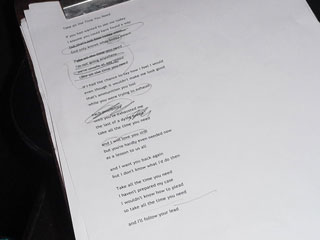
The circled bits are candidates for punching, the crossed out ones are the ones I allegedly "nailed" (as they say-- when you get it, it's nailed; when you don't, for some reason, it's a "clam." You fix the clams by "picking them up," but somehow in the process they get "nailed" too. No idea why.) It looks like I screwed up quite a lot there, but actually that turned out to be one of the nicest-sounding tracks.
August 13, 2003
Back to the Land
Here's a whole website devoted to the anti-modulation cause.
What, you didn't know there was an anti-modulation movement? Neither did I. In case you don't know, a modulation in a pop song arrangement is where the song changes key at certain strategic points, often near the end. It can shake up the song, provide a little extra "oomph" at the end, or simply put things in a new context by, at minimum, requiring the singer(s) to sing it in a different way and the players to use different voicings or inversions.
I think it sounds nice, but then I'm one of the offenders. And one day, when the revolution comes, the streets will run red with our blood, no doubt.
It seems that modulation is referred to as "the truck driver's gear change" by those who are offended by it. I'd never heard this term before, but it appears that the website's administrator didn't make it up. There is, I gather, an improbable, loose-knit underground movement of anti-modulation revolutionaries, with a language all their own, and I'm not hip enough to feature what they're putting down. I guess such activists see it as a cheap trick, giving unscrupulous songs an unfair advantage over those good and decent tunes that play by the rules? Like athletes taking steroids or the designated hitter rule? Songs should remain always in the same key, like the pure, honest, German peasant? It's a powerful (though, in my view, dangerous) notion.
Long ago, when I was more politically active myself, I was heavily involved in the Disco Sucks Movement. I realize the folly of these views now, of course, though some say the pendulum has swung too far toward the other extreme. What can I say? I was so much older then. I'm younger than that now.
(via Crooked Timber's Tom, who is himself a convert to the cause. Death to the fascist insect that prays on the life of the people, etc.)
UPDATE: "Pythagoras" ably defends modulation, though I imagine he'd agree that you could boil the case down to eight simple, unassailable words: The KKK Took My Baby Away. (Or is that six words?) Layne also has some comments.
I've had a couple of emails questioning my claim to be "one of the offenders." In fact, my songs incorporate key changes all over the place. The question you have to ask yourself when arranging is, do you want the song to migrate back to the original key after, say, the bridge (as in "Last Time I Listened to You") or do you want to follow the logic of the key change and take the song to the new level (as in "Mr. Ramones," "Swiss Army Girlfriend," "Stephanies of the World Unite")? In "Last Time..." pulling off the feat of returning to the key of D for the last verse involves several trucking gear fabs (or whatever they call them)-- E flat for the solo, A flat for the bridge, up to A (by means of those half-step punches that punctuate each section) which gets used as the V chord leading back to D. That was basically because I had a hard time singing the verse in any of the other keys; plus, I just thought it sounded cool. "So Long Sucker" changes from E all the way up to A for the end for the choruses, simply because I couldn't possibly manage to sing them in E. In the end, it sounded pretty cool, too. Or so I told myself.
We've also had several of the straight-forward, move the song up a whole step for the final chorus without ceremony thing that is apparently regarded as the ultimate sin by the arrangement reformers. Most recently, I think, in "I Wrote a Book about Rock and Roll." Why? It just felt right. You can put me before the Inquisition if you like, but you're gonna have to catch me first.
God said to Abraham kill me a song
I'm a little dazed from the journey through the fires of hell (i.e., Arizona.) Don't get me wrong: I had a nice time in hell (Arizona.) Hell (Arizona) is beautiful, with many very sweet people. But the fires of hell (Arizona) can sure take a lot out of you. Still, the recording must go on, and we're set to begin mixing in the next couple of days.
I've received several emails from folks, and run into a few of them at shows, who are themselves on the verge of recording for the first time, and many of them said that the little studio journal I've been keeping here has been instructive, yet terrifying. Believe me, what I've described has been a charmed, preternaturally smooth block of tracking sessions. The band didn't break up during a session (which is fairly common.) No one threw a rented instrument across the room, destroying another piece of rented equipment. No one spilled tequila into the board. At no point did the engineering staff have to leave the room for awhile in the interests of preserving the peace and preventing an imminent strangulation incident. No one pulled a gun on anyone. I didn't end up curled up on the floor in catatonic depression and remorse, sucking my thumb and weeping (as I usually do.)
As for the tracks themselves, they went unusually smoothly. There were basically no disasters. And so much of it came out great, far, far beyond any reasonable expectations.
Part of the reason there were no disasters, I have to say, though, is because we made some timely decisions to cut our losses as well as some of the more difficult corners, to concentrate on the things we really had time for. We decided to change the things we could change, accept the things we couldn't change, and outwardly to affect a pious "we can tell the difference" bravado. Or words to that effect. Serenity now.
I believe these were the right decisions in almost every case, but there's a part of me that will always regret them. We kept the drums set up and mic'd till the bitter end, just in case there was enough space to try to put down "She Runs Out when the Money Does." As the b.e. approached, however, we had to admit, with considerable reluctance on my part, that there was no way we'd be able to do the song justice with the time and resources remaining. We'd left it till last for just that reason, of course, but that doesn't mean it isn't disappointing. In my head, I heard a mournful death march as we carried the drum cases and hardware out to the truck. Ashes to ashes, funk to funky, and see you in hell (Arizona) old man. Something tells me we haven't heard the last of that one, but for now, it's beyond the wall of sleep.
"...and for my next trick..." was even harder to let go. I really love my demo of that song, but unlike the other demos and pieces of demos that we're using, the drum machine was not intended to simulate, guide, or be replaced by eventual real drums, but rather to stand on its own as a bossa nova machine track. In the context of the other demos, it sounds great, especially when you make the drum machine very loud and prominent; but next to the other stuff we've recorded, it sounded too low-fi. (Nothing wrong with low-fi, but that isn't how this particular song is supposed to come out.) Our plan was to "widen" the sonic landscape by adding overdubbed acoustic drums at certain strategic points, and dressing it up with more sound effects and vocals. (The arrangement was already very vocal heavy, but I had even more grandiose post production ambitions for this one.) We fooled around with it on that next to last day, but in the end it became clear that what we wouldn't have had time to do what we would have needed to do to it without sacrificing some key elements.
So we sacrificed the song instead. Because I'm so good at math, I knew we would have to lose a couple of the 15 plus tentative one we had on the list in order to end up with a 14 song album. I mean, it didn't come as a surprise. But it does leave a gap, and I hate gaps.
Even among those songs that were not terminated in the final trimester, I have nagging doubts about a few, mostly centering on the question of whether we did enough "stuff" to them to make them sound special and to distinguish them from the others. There are far fewer of these doubts this time around than usual, and I'm really happy with the sounds we did get. But again, in the interests of actually finishing on time and on budget this time (as I've said, a first) we had to let some things go. Some of this involved simply using more of the tracks I had already recorded on my demos, rather than trying to re-do them with better or more sounds. We ended up retaining the analog synth sound and organ on "London" for instance; my plan had been to try to find a trumpet player who would be good enough to do the part quickly and cheaply, but we struck out there. Rather than try to find a different, less funky fake sound, we decided to stick with the funky fake sound we already had, which I like all right. In fact, it adds a certain what's-it. I love artificial, out-of-place sounds anyway, and much prefer that approach to trying to sound "normal." The "London" stuff sounds about as cool as that kind of thing can be, in my opinion, even if it is only a Casio. Still, a trumpet would have been nice. But oh well, that's show biz. We also decided to keep more bits of the demo vocals than planned.
Certain things came off exactly as hoped for. The easy listening vocals on "Fucked Up on Life" worked out like I'd planned. Believe it or not, there had been a slight but very real possibility that we might have been able to get Al Jardine to sing some backups on that (since he was hanging out at the studio around the time I had originally intended to record the song for last year's lost and abandoned solo album-- in fact, the arrangement was cooked up with him in mind. Totally nice guy, by the way. When we were finishing up the mix for the incomplete Revenge is Sweet outtake "I was Losing You all Along" he called out helpful hints on the bass sound from the lounge in the next room. "That sounds a little picky, doesn't it? Trebly and picky? Don't mean to be, uh, picky. Ha ha." You gotta love him. My favorite bit was where he said, in passing, "you know, I've been having some troubles with my old band, you know how it is..." The "old band" being, you know, The Beach Boys.) Well, we didn't get Al, but it still sounds nice.
I'd say most of the songs "feel" complete, in fact. It's the most together-sounding album we've ever come up with, even in rough, unmixed state. The ones that worry, me, though, are the "sounds good, let's move on" songs, where we persuaded ourselves, or I allowed myself to be persuaded, that we didn't need to do all that had been planned because it sounds just fine as is. Often, this is quite true, of course. And you can screw up a song just as much by overdoing the incidental stuff as by leaving it off. It depends on the song, and the type of arrangement, different types requiring different things to serve the ultimate goal of getting the song across to the listener. There can be differences of opinion on this, and usually the people working on them don't have a lot of perspective while it's going on. Sometimes you don't realize what you did wrong till years later. There have been cases where I have regretted making that kind of decision (the recent example that springs to mind is Alcatraz's "Our Days are Numbered," a great song that could have used something more.) That's really the only reason my optimism is slightly guarded. (And I gotta say once again, any optimism at all is quite a novelty in this situation-- I'm usually ready to shoot myself at this point.) And believe it or not, a perverse part of me also wonders whether some songs are too competently executed: we don't want it to sound too normal, do we? Or do we?
So there you have it, or better or worse. Fourteen songs, five of which appear in some form on "eight little songs." Two casualties and counting. Delusions of grandeur. Self pity. Letting I dare not wait upon I will. Elation. Massive headache.
August 10, 2003
All You Need to Know about Arizona
It was 111 degrees in the shade this afternoon in "downtown" Tempe.
August 09, 2003
Learning Curve
So I have this song called "Oh, just have some faith in me." We've been playing it (trying to play it) for the last couple of years, but could never really get it right at the practices. We tried it live a few times, once I remember at a show in Sacramento and a few times on that last Japan tour: the audience, especially the Japanese, smiled indulgently, politely, but you could tell that the forbearance had taken its ever so slight toll on the welcome that a band is always trying not to overstay. Something was missing, though I continued to maintain, in the face of growing skepticism, that it was a good song and argued quite strenuously for its inclusion on at least the B list of album contenders.
Even though it doesn't particularly lend itself to solo-acoustic accompaniment (it's more a loud, hard rock sort of tune) I tried playing it at one of my solo shows back east awhile back. And, strangely, I was able to get it across that way, even though it was clearly the wrong instrumentation and no doubt sounded, as an objective matter, pretty ridiculous. But I'm not mistaken about that getting it across part: I asked a kid afterwards if he remembered it (yes) and what he thought of it; he said "you're trying to say you're Christ on the cross of love?" (Don't you love how I've somehow acquired a little fan base of weird, smart kids who are kind of like me in that they would say things like that? No? I think I almost do...) Well, he was kidding around, but so am I (kind of) and damn, that's a pretty accurate summary of the song's conceit and the narrator's bathetic pretensions. So I realized it was possible. I didn't want to change it into an acoustic song, though. Part of the whole deal was for it to be "heavy" rock, with choir-esque back up vox and a religious-sounding churchy organ. I wasn't ready to give up on that dream.
Of course, when we practiced it and played it at gigs, none of this choir and pipe organ malarky was there. But that couldn't be why the song never "worked." I don't think I or my demo ever totally communicated the kind of song it was supposed to be. However, once we started working on it in the studio, it turned out to be one of the biggest surprises. Everyone was shocked at how good, how unlike the unacceptable live performances, it turned out. I got the "heavy-ness" I wanted, the choir-y vox, the leslie-speaker organ, (and an amusing-- to me-- "Judy Blue Eyes" harmony at one brief point-- which is off topic, but nevertheless...). That was how it was supposed to sound, and it totally was "working."
So here's the weird thing. We played that song last night in Anaheim for the first time since recording it, and it totally rocked. To my complete and utter surprise. And the audience seemed to "get it." (I doubt they "got" it at the level that the lovable, precocious misfit in Hoboken did. That's the thing about a live rock and roll show: you have to make the audience "feel" how great the song is, because they can't take in the part of the content that would make them "think" how great it is. They have to feel it without necessarily having to understand why. That's one of the biggest challenges to the dubious endeavor of putting singer-songwriter type songs into rock and roll form: the songs have to be constructed so that they work both ways simultaneously. Feel now, think later. And if you're on the low-end of the show business spectrum, as we are, you have the extra task of taking into the account the fact that you're usually going to be playing in places with bad acoustics and minimal PAs. You've got to make the poor circumstances and bad sounds work for you rather than against you, and it's not easy.)
So what had changed? It's not that lily-gilding window dressing production stuff I was talking about. We didn't have any of that stuff, and since our monitors were non-existent, I imagine it sounded pretty primitive, even horrible. I guess it's probably the fact that the recording process provided the means for the band finally to understand the song properly. Otherwise, I can't put my finger on any specific thing that might have changed between playing the song in Japan and playing it in Anaheim. Understanding has to be it.
Quarterly Review of Improvement Areas
At that Lookout anniversary party at the Parkside awhile back, I ran into Alex, an old college friend I hadn't seen in quite awhile. We subsequently exchanged a few emails, as you do, and she sent along this page from a bride-to-be's notebook, which she had found on the street somewhere.
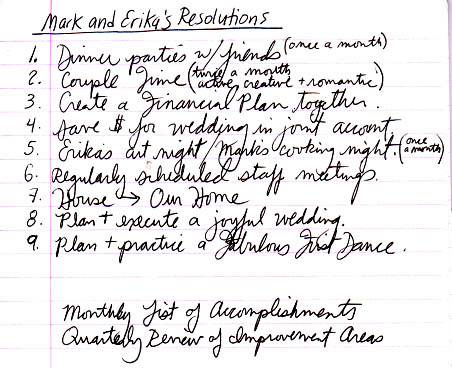
She also has this great web site compendium of "street debris" found in San Francisco. Shared interests after all these years...
August 08, 2003
Big Old Jet Airliner
Spaceland, the club we played last night, is located down the road from Matt Welch's house, so I had a chance to hang out with Matt and his wife, the lovely and talented Emanuelle (whom I had never met in person before.) Great, smart conversation about music, the blogosphere, Arnold (of course), Prague, Europe, the INS, lots of other stuff, you name it. (I wish I could remember all those things about which I thought "note to self: remember this." One good bit was the discussion about surface noise and tape hiss, and about how listening to Sticky Fingers on CD just doesn't work. You miss the record-related sounds, the floppy needle sound before it finds the groove, the rough, scratchy sound that somehow kind of matches the guitar sound. Even that brief moment during which the automatic arm creakily makes its way over to the edge of the record and drops down is part of the experience. And, as per his example, that skip on "Can't You Hear Me Knockin'". Of course I know exactly what he means, even though my skip is toward the end of "Sister Morphine.")
If I have this right, Matt's plan was to write a whole column (deadline 10am) when he got home from the gig. Damn. I couldn't have written my way out of a paper bag after all that punishment. The long arm of the blogosphere was evident in the fact that Greg from the Talent Show was, to my surprise, also in attendance; and the fact that that arm stretches out to touch the rock and roll world far more than you might think was evident in the fact that he was hanging out with Kim Shattuck's sister. Jeff Whelan from Tsar was there, too, along with several other usual suspects.
I can't say the performance was stellar. We're still a bit rusty, from all that studio playing (which is totally different from live playing and doesn't at all "count" as practicing-- in fact, it can even do considerable harm.) I don't know how it is for other bands, but I find we're constantly in a state of trying learn our own songs, even those we've been playing for fifteen years. (Yesterday, driving down I-5, we spent a bit of time trying to remember how certain oldies, er, classics, went, and it sounded like: "okay, I think it's: why don't you C F your CFC 'cause a little F can make F minor difference A minor than D minor you're trying to G...") I'm on auto-pilot on a lot of this stuff, it's true: the trick, though, is to get everybody's autopilot to synch up, or come pretty close. We haven't yet hit on the formula to make this effortless. I think there might be some kind of glitch in my autopilot from time to time. There are just too many chords and words, and I'm a bit absent-minded. Maybe there's some foul play involved as well. Anyway if everyone's following me, and I space, the whole operation can come crashing down, killing all on board and not doing the parent company's stock any good. My solution: arm the audience. No, really I'm just kidding about that. I'd prefer a sturdy steel door between me and them, sometimes, anyway.
Seriously, though, there is always a sense in which (or maybe I should say a feeling that) you're covering your own songs when you try to take songs that were shaped in a recording studio and make them work in a little club when no one can hear what you're saying and you can't correct any mistakes. Sure, the songs exist as disembodied words and music beforehand, and you might have played them a certain way live before you "put them down." But the process of recording almost always changes the songs in small or huge ways. And the very existence of the completed recording exerts an influence even after the song incorporating such changes has already become effectively set in stone, subject to gradual, imperceptible evolution/devolution, but with a publicly accessible "original" to which it will always be compared. (Not that you can't improve on this "original" if you try-- in fact, it would be hard not to improve on most of those old recordings of ours; though sometimes the best thing you can do to improve a song is to decide not to play it. But that's a different sort of thing.)
The goal of recording playing on the one hand, and live playing on the other remains the same: to get the song across. But there are totally different criteria for what works in those two contexts: hence the challenge of coming up with studio arrangements of songs that sound okay live but lack character as is in two-dimensional recorded form, and live re-arrangements of those re-arrangements in a way which will be understood, and which you can pull off, in front a live audience of drunken, not necessarily very attentive or interested punters.
We're in strange situation with our new stuff because it has been "recorded" but not finished (i.e., not mixed and mastered.) All sorts of things will happen to it in the process of getting mixed. In a way that's similar to the much more dramatic changes the song and arrangement goes through during the recording process. These songs are in limbo at the moment, and no one knows for sure what's going to happen with them (though I have a good feeling about it-- we really did get great sounds.) I wrote them, we practiced them, we played them relentlessly, ad nauseam, in a zillion different ways by a zillion different means-- but we really don't know them yet. Stay tuned for that.
August 07, 2003
Reviewing the Situation
Lord only knows what Kevin and I might have been arguing about here. Or maybe we weren't even arguing. I think this is from around the time that we had all but decided to cut "...and for my next trick" though.
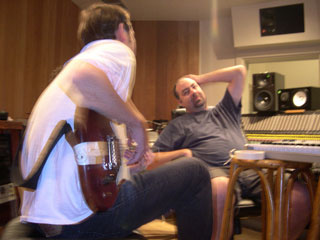
Random Pics from Back-up Day
Bobby J. singing, napping:


The great cymbal over-dub of '03:
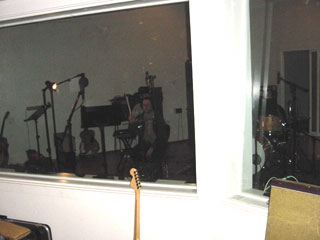
When in doubt, try the magic vocal glasses:

Back to the Rock
I'm planning to post some more recording updates and comments on this or that aspect of the recording process (including the bittersweet feeling of having finished the tracking, while the character of the end product nonetheless remains largely unwritten/unmixed and could go several of many different ways-- nothing like it.) However, I'm not sure I'll be able to get to much of that before the shows this weekend.
Here they are again:
Thursday, August 7: Spaceland, L.A.Friday, August 8: Chain Reaction, 1652 W. Lincoln, Anaheim
Saturday, August 9: Bash on Ash, 230 W. Fifth (at Ash), Pheonix, AZ
Sunday: August 10: Club Congress, Congress and 4th St., Tuscon, AZ
All these shows are with Stay at Home Bomb. And, to my surprise, famous lesbian folk singer Phranc has been added to the Spaceland bill. Should be interesting. Stop by if you're in town.
Plus, we're playing on Fri. August 22 at the Gaslighter in Campbell, CA with the Suburban Legends, The Huxtables, Mele and Solemite.
August 06, 2003
New Boss, Old Boss
Oliver Kamm has a couple of good posts (here and here) on the Baader-Meinhof Gang/Red Army Fraction. They were provoked by a post from that Beatnik Salad guy from Manchester, who somehow managed to come away from the recent Channel 4 documentary on the subject with a favorable, romanticized view of the terrorists' "ideals," and an equivocal view of their actions. (The post, amazingly, was entitled "Long Live the RAF! Down with the pig system!")
Kamm's excoriation of this fellow is apt, unassailable, though it brings to bear several times the rhetorical force required by such a small, easy target. Whether or not young Ryan from Manchester is the "stupidest blogger alive," he is clearly out of his depth, and it's not particularly difficult to see, with or without the full-spectrum Kamm treatment. Still, "fisking" aside, Kamm's posts contain some interesting, little-noted details (including some links to the more recent writings of Horst Mahler-- follow them if you dare); and his overall assessment of the RAF is absolutely correct and well-stated. Well worth reading, as usual.
My interest in the Baader-Meinhof gang specifically was sparked by Paul Berman's masterful essay on "The Passion of Joschka Fischer" in the New Republic a couple of years ago. I suppose my long-standing fascination with 60s terrorist groups and the moral/intellectual midgets who apologize for them ultimately stems from the circumstances of my upbringing: growing up in the Bay Area in the '70s, the SLA, the Manson family, the Weatherman, Che-worshippers of every stripe, faux-Maos, as well as ordinary folks who found it aesthetically pleasing to incorporate dashes of hippie politics into their suburban lifestyle, contributed to a cultural complex, an underlying, hard-to-pin-down ethos that exerted tremendous influence on day to day life, in ways that only became apparent to me much later.
"Ethos" is the wrong word, really: in its diluted, mid-70s suburban Bay Area form, it was more like a conglomeration of aesthetic judgments, choices about which cultural symbols and rhetorical platitudes would best express the vague aspiration to be part of some wave of the future, any wave, any future; rather than the imagined hide-bound, sexually-repressed, boring, close-minded, intolerant, un-hip, stick-in-the-mud past, which, as far as I can tell, never actually existed to any great degree in the Bay Area. (Ironic that, of course, since this aesthetic-masquerading-as-ethos was, in retrospect, very clearly on the way out, not the wave of any conceivable future except as a curiosity to be observed in the form of tiny remnants trapped in Berkeley's amber; at the time, and to a kid, though, it wasn't clear quite how much it owed to nostalgia and sentimentality.)
An important element of the complex, I've often fancied, is a general psychological condition that fetishized and aggrandized ordinary, adolescent rebellion against parental authority, and invested it with universal significance, making it and its concomitant sensations the focus of life and politics, to such a degree that experiences that do not include the sensations are found lacking, unexciting, inauthentic, suspect; the flame of sticking it to the old man had to be kept alive, and neither the absence of an actual old man to stick it to, nor the fact that one has become an old man oneself, has much bearing on the matter.
Maybe I'm way off base with this psychological stuff, but it does seem to me that, for my generation, something like this spirit, though often muted or diluted or rationalized in a new, non-drugged form, animated many (most?) of our elders (parents, teachers, priests, et al.) And in later life, the older, fringe denizens of the punk rock world, many of whom were themselves aging '68-ers or sympathizers, continued the tradition. I absorbed the lessons all too well, perhaps, as I often adopted a contrarian attitude towards the contrarians, a habit that continues to this day. There's no great harm in it, in itself. Being required to read (and love) Catcher in the Rye each year from age eight to eighteen by adults who effectively stood around you with expectant, frozen, desperate smiles, shivering with excitement each time you turned a page; or listening to bands who lifted their lyrics in toto from subliterate articles in the Revolutionary Worker and were granted a reputation as dangerous, deep-thinking intellectuals in return; or sitting through endless coffee shop discussions about "the Revolution" amongst other children playing political dress-up, none of whom were capable of noticing any irony in the situation-- other than boredom, we're not talking about any great hardship. "Question Authority" isn't a bad motto, even if those who brandish it often seem mysteriously to exempt themselves from the questioning process.
It wasn't till I read Berman's piece, however, that it really dawned on me just how much and how completely the spirit of the New Left and '68ers, in their period of unwitting decline, had influenced and shaped the world in which I grew up, and the degree to which this might have been something like a more generalized Western experience. The SLA loomed large in my childhood, as a news item and a not very well understood topic for imaginative speculation, as did the Manson clan (who, it seems to me, differed from the "political" terrorists/murderers only in that, for whatever reason, they failed to dress their lunacy/psychopathology/nihilism/apocalyptic delusions in malformed faux-Maoist pseudo-academic jargon-- an affinity that was demonstrated by the Weather Underground's explicit endorsement of the Sharon Tate murders, the "Year of the Fork," etc.) And it's really pretty astounding how few degrees of separation there were between the SLA and the ethos which motivated and spawned them (and which they "perverted" to some degree certainly) on the one hand, and, on the other, the spirit animating the much more benign, provincial, well-meaning, dippy, even occasionally right or beneficial, would-be alterna-establishment that made up the Authority for Bay Areans to Question, if they were so inclined. Am I exaggerating this affinity? Probably. But I think it's there. And the fact that quite a few otherwise relatively benign, if addled, 60s people continue to indulge, excuse, romanticize, and equivocate when it comes to groups like the Weather Underground, the SLA and the RAF seems to bear that out.
The Baader-Meinhof Gang were like a less inept, slightly larger, and, strangely, more popular, German version of the SLA. The "twist" on the pattern was a more pronounced focus on an ill-disguised, "classic" anti-Semitism, not particularly surprising given Germany's history and the socio-pathology and instability of these particular actors. There are several good books on the subject, including Hitler's Children by Jillian Becker. This website is a good, extensive introduction. As Kamm points out, quoting Berman, their Leftist rhetoric hid their affinities with an earlier generation of thugs (Nazis) only from those who wished to be deceived:
A new suspicion was dawning on these people [West Germany's New Leftists] - a little tardily, you might complain, but dawning nonetheless. It was a worried suspicion that New Left guerilla activity, especially in its German version, was not the struggle against Nazism that everyone on the New Left had always intended. It was a suspicion that, out of some horrible dialectic of history, a substantial number of German leftists had ended up imitating instead of opposing the Nazis - had ended up intoxicating themselves with dreams of a better world to come, while doing nothing more than setting out to murder Jews on a random basis: an old story.
Strangely given their archaic nature, the RAF, the SLA, and their ilk continue to pop up, their distant words and deeds causing bizarre reverberations amongst their mercifully few, pathetic, misguided apologists and requiring remedial commentary by civilized critics in response. Kamm:
the issue of political terror is too important to our own security and the values of a free society to forget, still less romantically mythologise.
Quite right. Yet there are those who, for reasons of their own, seem determined to get fooled again. And again.
UPDATE: Kamm adds his final comment on the inter-blog sniping amongst the small fry sparked by his post.
August 05, 2003
I Dig Rock and Roll Music, I Can Really Get in on that Scene
Rebekah (who did/does the massive, no-longer-much-updated mtxstarship.com website) forwarded a couple of pretty good emails she received at her site address.
One of them was from a guy who said "that song with no words, something about a girl shopping" made him cry in Borders.
Here's the other:
i'm going nuts. there is an MTX song that i just LOVE!! but i cant remember what its called. but i know some lyrics areKiss me and smile for me, show me that you'll wait for me, hold me like your never letting go....cause i'm leaving on a jet plane, dont know when i'll be back again, oh babe, i hate to go.
any help in what its called?
Gang Vocals
One of the better extemporaneous ideas (as opposed to those that had been plotted for months and years beforehand) was to have a crowd of folks shouting the "take that letter" lines in "The Boyfriend Box." Someone said "it'll sound like Rancid," but it didn't actually, much. More like a Phil Spector-y, Shangri-Las-y type of thing. And it's almost as though we spontaneously, collectively affected a kind of fake New Jersey accent as well. How's that for genuine faux authenticity?
That's me, Ted, Bobby, and my dear friend Jen (who videotaped a sizeable chunk of the recording sessions as part of her still-in-progress ten-years-running documentary about my pretend career-- we may post a bit of that at some point.)
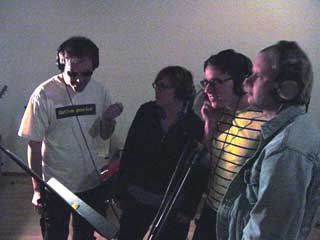
The Paper Plate Method for More Efficient Recording
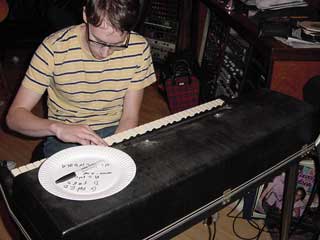
Whoosh!
We finished all the tracking. On schedule. I'm spent, but not insane or suicidal or anything. (No more than normal, anyway.) Weird. Never happened before in the history of my pretend recording career.
Tracking was two weeks with two days off: twelve days. We'll spend six days mixing in a week or so and still have time for one extra "fix stuff" day before the mastering.
I still can't quite believe it.
Favorite quote from yesterday (from Kevin Army, after I had done a particularly weird barbershop quartet-y back-up thing on a kind of heavy song):
I'm just trying to decide if I've ever heard that particular combination before: Van Halen plus Starland Vocal Band.
Second favorite (from engineer Mark Keaton, when conversation turned to the topic of "Afternoon Delight.")
What's that song about, anyway? Anybody know?
I'm punchy. More details, pics, etc., when I unwind a bit.
August 04, 2003
Sounds Good Let's Move On
Yesterday was back-up vocal day, though we did a few keyboard tracks and some percussion overdubs in the midst of everything. In many ways, the back-ups are the most frustrating part of the whole recording experience. My vocal arrangements can be ridiculously grandiose, especially this time around. I hear the parts in my head, and I work them out on the piano and demo them on submixed multitracks at home, but when it comes down to singing them into a mic and getting them to come out right, it's way more difficult than it seems like it ought to be.
Bobby and Ted are great singers, and both of them have really nice-sounding voices (far nicer than mine, which isn't all that hard to achieve perhaps, but is an added irony in this situation.) But we run into the same problem I've mentioned over and over again since I started trying to document the recording process: trying to use words to explain sounds is nearly impossible. It doesn't matter how much you practice, or how well-conceived your arrangement is. You'll have trouble explaining how it's supposed to go, and executing it properly, regardless of how great a singer you are. And even if your description is perfectly accurate (i.e., "singer A sings the major 7th, while voice B slides from an octave above the root up to a 9th, while the lower root is covered by singer B, the organ doing the fifth. No third.") you still run into problems trying to make it come out of your throat properly.
Plus, when you get up the mic, or when you're sitting at the board having explained your nutty idea to the other poor schlep who you've just tried to explain it to, you often can't remember what the hell you were supposed to be singing. And sometimes it turns out that no one really knows. It sounds good on the demo. But what exactly are those notes? Every time I go through this, I say to myself, "self, next time you should really write this stuff down." As goony as it sounds to imagine bringing in "charts" for the vox, it would probably help. Last night, when the producer and engineer went out for dinner, Ted and I listened to some of the the demos, trying to construe and reconstruct the long-ago submixed notes, frantically scribbling them on paper plates (the only paper available) with loads of question marks. It would also help if I kept the parts separate on my demos, but I only have eight tracks at home; sometimes I end up with four or five distinct, multi-tracked parts on a single track. So I'll hear it and say "that's supposed to be a minor 9th." But hell if I can figure out the precise configuration of the different voices and instruments that made the demo sound right.
Of course, if I had unlimited time, I could just repeat the home process in the studio, trying everything out till it was right. But we don't have that kind of time. So you have to scramble, and inevitably parts that are supposed to be there don't end up happening, leaving yet another psychic scar that will trouble your soul and fill you with remorse and melancholy for the rest of your life. (My soul is pretty much one big, hardened callous from this sort of thing over many, many years-- yet it somehow still has the propensity to whimper an endless stream of silent self-pitying laments over what might have been. Engineer: that sounds good let's move on. My eyes say yes, but my soul is crying in the corner. I've heard there's a drug you can take for that.)
I think one of the main difficulties is that the process is so tedious, especially when you're recording parts that are not going to be very prominent in the mix and are not as important as the other parts which are more fun and which you also don't get to spend enough time on. Sometimes you have the right idea, but it's in the wrong voicing, say, and you don't have a whole lot of time to experiment to get the combination that's going to work. Sometimes you only have one shot at "selling" the part to the other interested parties. If you blow it, the part is gone. There's so much else to work on that there's not a lot of room for tinkering, especially in the face of a room full of skeptics. I put a sketch of the vocal arrangement on my demos, but I've found that it often doesn't sink in that way. So I often feel like I'm "auditioning" for my arrangement when I'm doing the parts or trying to get other singers to do them. Sometimes, even when I get my way, I can tell they're humoring me and not really seeing it the way I am. ("OK, I'm going to do another track of that." "Really? Uh... really? Well. Hmm. All right. Okay you're rolling...")
Last night, we ran into that kind of situation with one of the more deceptively complicated arrangements. (I say "deceptively complicated." I think Kevin described it as "insane.") This is on "Elizabeth or Fight!" The basic guitars are playing very straight chords in a minor key and the lead vocals are very straight as well. The two e-bows and the four back-up parts, however, make some of those chords into jazzy, strange-sounding chords.
One of them is a simple major 7th, but it sounds strange-- cool, in my estimation-- because of the context; the other is much weirder, and I don't even have the music theory at my command to describe it without looking at a keyboard which would not be convenient right now. It centers around the fact that the flatted third of the C minor is the same as the 7th of the F, but the instruments aren't always playing enough of those chords to make it clear exactly what they are till the voices come in, so sometimes you get a Cminor to F7, while at other points you get a Cm9 to F6. I think it's a cool effect when it comes in on the second chorus, having set up a more rational-sounding context the first time around. But when you've been hearing the song for weeks without the completed chords, it might take some getting used to. I just hear it in my head the whole time. Anyway, it took me awhile to realize that everyone but me thought this was some kind of mistake, like I was accidentally singing the wrong note. And I as was trying to get my parts right, they were trying to "fix" them by changing them to more rational-sounding notes. (It's like: "You're flat again." "Damn, hey wait a minute, I'm supposed to be flat-- it's a minor chord there." "It is?" OK-- that's an exaggeration, but that's the kind of thing I mean.)
Eventually, I got it the way I wanted it, pretty much, though if we'd had time to work on trying out different voicings of those notes we might have done even better, and everyone might even have been happy. In a perfect world, we'd be able to take some time off from the song and give it another shot, but as it is, with the back-ups seated properly in the mix, it basically does what it's supposed to. I'm just going to pause for a moment to imagine that perfect world again, where I'd also get to add around a dozen voices doing all those things. Ahhh... but, back to reality: I think I've sold Kevin on the major 7th; I have a feeling I may have to fight for the minor 9th, though.
And it's all just four beats, one syllable, the word "or."
I'm happy with the parts we have so far. But today is the absolute last day of overdubbing. We can afford no more. I'm going to add my contribution to the back-ups, including some of the weirder parts, today. I might not quite get my ideal choir of insane/retarded angels on every song, but we'll probably be able to come close on some of them. I think we'll just make it, though we may have to stay up all night. But it's a bit scary, nonetheless.
August 03, 2003
Songs in the Key of Stupid
A couple more pics.
Kevin Army trying to turn my retarded onomatapoeia into a kind of reality:
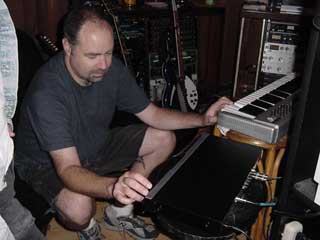
But there's nothing like a Wurlitzer:
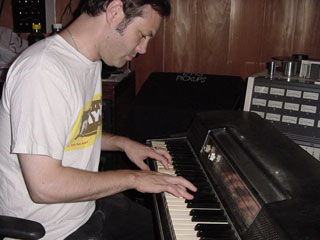
Incidental Music
As I feared, I lost a bit of momentum on the day off. That is, yesterday there was an abatement of the mania which tends to take hold when you're recording, and which is absolutely necessary for doing your best work. Or for doing your work at all. I think it had the same affect on Kevin Army. The pace was slow. Still, we did get quite a bit accomplished. The acoustic guitars are all done now; Jym did some percussion overdubs; we transfered the solo/acoustic-y songs from the demos so that we could start to work with them; and did some keyboards and spent a good bit of time experimenting with sounds.
There are four songs from the demos that we're working with largely "as is," i.e., we're going to use the tracks I recorded, adding a few things in some cases. "Big, Strange, Beautiful Hammer" works as I played it in my bedroom, but last night Jym played some subtle snare drum with brushes that sounded pretty nice. I was skeptical about it, but in the end I was persuaded. I'm still not sure about the vocal. I'm hoping to get a shot at redoing it today. "Institutionalized Misogyny" is going to be pretty much the way it is on the demo/CD, as is "Jill" most likely. (That's the song Kevin is least sure about-- but that might be influenced by Chuck Prophet's demo of the song, which he liked a lot better. All I know is, it's quite a crowd-pleaser, and a pretty well-composed lyric with a consistent and integrated "conceit.") The final one of these, "...and for my next trick", is one of my favorites, but a long shot as far as pulling it off: bossa nova-folk-vocal pop type thing. That's the one on which I spent the most time fooling around with synth sounds. I wish I had a couple of days just for that, but sometimes there's no use dreaming.
As I've mentioned before, talking about sounds is difficult: the attempts always fail, and are usually pretty funny. You should have heard me trying to explain to Kevin the sound I wanted to incorporate into the "Oh, just have some faith in me" arrangement.
"You know that airplane-y zhooew zhooew squink white noise wave thing that goes sheeeooorrrwoei and the other type that goes ffffewwwwwwwwooorrrr? Can we put those together with one going up and one going down across the stereo image and get a configuration that has a couple of glorps around the edges with a rumbly, bubbly blblblblbl (but no plink plink-- unless you think a little plink would help)? You know the kind of thing I'm talking about?"
Kevin: "I have absolutely no idea what you're talking about."
Oh well, we'll figure it out in the end.
We did put some very cool sounds on "She's not a Flower." Like most of the synth and organ parts on our records, they're intended to be subliminal, felt rather than heard for most of the song, but maybe popping up at strategic moments once or twice. That's how it's going to be on that song, which is a very rational, fast, "rockin'" song-- probably the most like the traditional "pop punk" that my band is known for of all the songs. (There are others vaguely of that type on the list, but that one stands out.) However, while we were fooling around with the sound effects, we came up with a quick mix that turned the arrangement on its head and made it clear that, if we wanted to, we could make the song sound like something off "Heroes." (If those guys had been into playing songs at 199 bpm, that is.) I have to say, that sounded pretty great, though it's not how we're going to do it. If I could think of a place to have an alternate mix though, it would use it in a second. It would freak people out, anyway, which I always get a kick out of. Plus, it just sounds hell of cool.
For the acoustic guitar, we ended up using Kevin's old Martin. It's his guitar from when he was a teenager, and, owing to habits that are arguably more slovenly even than mine, it spent eight years in a dank closet in the '90s. When it emerged, it was covered with thick, white, putrid mold. Instead of throwing it in the trash like a rational person, he cleaned it with Clorox and restrung it. And it sounded great, better, legend has it, than it ever had before. Like a fine wine or single malt whisky; or a hunk of Stinking Bishop.
Here it is, complete with gay stickers and duct tape:
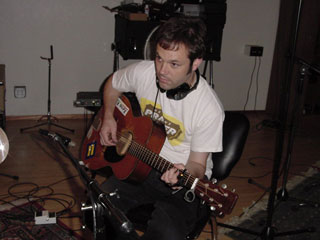
Today is going to be back-up vocal day, though I'll probably try some more keyboards and lead vox toward the end.
August 02, 2003
You deserve a break today...
Distressed guitar, tasteful decor, and high fashion-- the perfect combination:
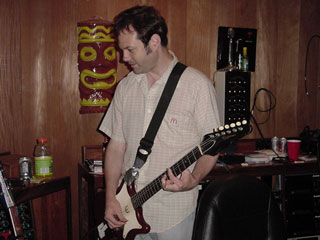
Shifting Gears
I tried to practice and work out some of my keyboard parts yesterday, but I was in crash mode and really couldn't concentrate. I knew the thing to do was relax, but I couldn't figure out how. So I did a pretty weird thing: I went to see that Weather Underground documentary, which was playing at the cinema I pass on my way to pick up the mail in Berkeley.
What a strange, disjunctive experience. In the context of what I've been doing for the past couple of weeks, I mean.
It's a well-made documentary, though it would have been far more interesting (to me) if the film-makers had challenged the WU alumni to do a bit of self-analysis and to examine why such smart, privileged, educated people found it appropriate and ethically unobjectionable to turn to evil and terrorism, and, on occasion, blithely to contemplate and countenance mass murder; and why some of them, as it seems, still cling to shreds of the crazy ideas that they still refer to as "ideals." (I'm referring to self-analysis beyond the "Viet Nam just drove everybody crazy" cliche that is invoked repeatedly throughout the film.) Presumably this was in the interest of neutrality, and there's something to be said for that, too, of course. Yet Todd Gitlin has some appropriately stern and challenging comments, and it would have been interesting if the documentarians had presented them to, say, Bernardine Dohrn as she strolled past her old houseboat safe house in Marin.
There's a hint towards the end that a more confrontational approach might have yielded results, when Mark Rudd tentatively attributes his reluctance to discuss his radical activities in a personal way to his being, to a degree, ashamed of them. And to his having difficulty sorting out which elements he should and should not be ashamed of. It's the barest allusion, but for me it was the most interesting and affecting moment in the film.
Some of these people, though, have no shame. Bernardine Dorhn and Bill Ayers are every bit as loathsome, narcissistic, arrogant and unrepentant on film as in print. In the film's most irritating contrivance, a smug, smirking Ayers strolls down the Chicago street that was the scene of the "Days of Rage" debacle, reminiscing about his glory days with baseball bat in hand. Nice.
Others, like Naomi Jaffe, present a more engaging, tasteful demeanor, yet still seem disinclined to consider, perhaps unable to grasp, the fact that there may be some connection between the theory and practice of random "revolutionary" violence. For Jaffe particularly, urban terrorism seems to be not so much a moral problem as a peripheral accoutrement of a wondrous, self-actualizing opportunity for personal growth; we thought a worldwide, reality-transforming revolution was happening, and we owed it to ourselves to "be a part of it"; and even though we were wrong about the revolution part, we still "got a lot out of the experience." "I'd do it again," she says. "If I didn't have a baby and a family, of course." Self-actualization takes many guises, and whether it inheres to urban terrorism or middle class motherhood is merely a matter of choice and circumstance. Such superficiality, such unreflective solipsism is the very essence of what makes "'60s people" so profoundly irritating to all of us non-'60s people. Most of the ones you meet, however, don't have quite so much explaining to do as these characters.
I'm pretty sure most of the folks in the theatre (around 30, which was a pretty good crowd for a 2pm matinee) found these bromides more persuasive than I did. There's one point where Mark Rudd says that Americans are "taught from an early age" that people who commit random acts of violence against others outside of a "state-sanctioned context" are either criminals or insane. His manner and tone conveyed the fact that he believed this was regrettable and unfortunate, an unjustified mis-attribution the notion of criminality and insanity. And I heard murmers of agreement from the audience. I think I was the only one who said "well, duh!" I hope it wasn't too audible.
Back in the saddle
Because of circumstances beyond our control, we had to take yesterday off. Everyone needed a rest. I sure did. I believe I've started to crash a bit, and my main worry now is that I may be unable to rev up again fully. I've had a mini- to medium nervous breakdown near the end of every album, followed by a spectacular crash at the end and a lengthy aftermath of lethargy, remorse, and near-catatonia-- that's cool and everything, but in this case I really need to time my meltdown so it occurs after the overdubs are finished.
We're trying to pack everything into two days, but we can theoretically afford three and still be on schedule. Translation: we won't quite finish in three days, but we'll be close enough that we can deal with it.
The original plan called for a week of solitary (and free) recording in my apartment before mixing; we were going to do basic rough mixes to ADAT tapes, and I would fill in the remaining six tracks with all the incidental parts were weren't able to do in the studio. Plus, I wanted a chance to experiment with some of the texture stuff I've been doing at home. If this recording had followed the pattern of previous ones, which we had had to assume, I'd have been doing all the back-up vocals and maybe even some of the lead vox as well at home. (Miracle of Shame was recorded like that-- we borrowed the Neuman mic from Sharkbite and set it up in the kitchen, while Kevin sat in the bedroom punching me in and out. It was an interesting novelty, but it annoyed the nice upstairs neighbors-- one of whom came down at one point to say "I'm real sorry Frank, but I just can't handle hearing that song again"-- and it's not something I'd care to repeat. Believe it or not, my kitchen is not acoustically perfect. Plus, it smelled kind of weird in there. That was the first time I'd been in there in months...)
Because the hard parts (drums and vocals) went comparatively smoothly this time, we're reconsidering this plan. Transferring the mixes back to ADAT itself would take a day, and it's probably wiser to use that time overdubbing. I'm going to miss the solitary sound exploration angle. (We've got four shows smack dab in the middle of this period, anyway, and I don't know how much time I'd get to spend in any case.) My current line of thinking is to adopt a compromise: identify a small number of tunes that might benefit from my being alone with them for awhile, submix those, and see what happens.
We're supposed to go in today for a full day, and with luck, we'll be in a better position to decide after that.
August 01, 2003
Vox in Socks
Here I am during that first vocal session:
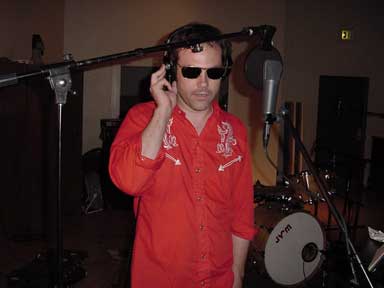
The sunglasses were laying around at the studio and I started wearing them to amuse people, as you do. I said "whose are these?" and Mark Keaton said "they're yours now," adding that they made me look like a villain from the Rockford Files or something. I wore them during the first song that went so surprisingly well. When it was time to do the next song, I figured the routine was wearing thin and was actually preventing me from reading my lyric sheet properly (not that I often need that-- I know these songs extremely well.) I took off the glasses, but Kevin Army insisted that I put them back on. That vocal was great, he said, don't change anything, not even the "magic glasses." So they have become my vocal glasses, I guess.
(I'm planning a future post on all the superstitious/obsessive-compulsive habits and tics that you accumulate as aids to your vocal performance. The title refers to the fact that, for some reason, I used to take my shoes off for difficult parts. No idea why. No big difficulty arose this time, so it never had to happen.)
That mic is a Neumann TLM 190, and it's running through the board, a nice vintage pre-amp, and several compressors. Believe it or not, there's a Peavey (!) compressor in the loop. Who'd a thunk it?
Running out of Time
We had three things on the agenda yesterday: acoustic guitars, e-bows, and finishing out the lead vocals. Sharkbite has really nice Taylor acoustic (probably the best-sounding acoustic guitar I've ever held in my hands) but for some reason we could never get it to sound good with any of the mellower tracks, and by "mellower tracks," I mean the non-heavy ones where it is intended to be audible rather than only barely perceptible. We put it on the loud, ringy, wall of sound song "Elizabeth or Fight!" and it sounded great. But on "Everybody Knows You're Crying" and "Sorry for Freaking out on the Phone Last Night" the chorusing and overtones/harmonics were too weird when added to the track. Tuning again. We tried various tuning methods before we gave up. We're going to have to bring in some others. The Yamaha I always use is little more than a toy, though I've used it on many records and on all my demos. Kevin has a pretty nice Martin and (my favorite) his Grandma's guitar, an old Harmony archtop. It's not just a question of getting it to stay in tune, but of judging which version of slight not-quite-100%-perfect-in-tune-ness is going to enhance the track in question rather than make you want to shoot yourself. So we have to keep fooling with that.
We've got two e-bow songs this time around, "Elizabeth or Fight!" and "Fucked Up on Life." For those who don't know, an e-bow is a little vibrating device that you hold near or on the strings above the pickup of the guitar. It's meant to be an "electronic bow" like a violin bow, and it's true that you can get a kind of metallic cello-like sound if you're careful and/or lucky. Mostly though it's difficult to control and just sounds like itself: an over loaded, harmonic-generating tone that sounds fat and rich and/or squeals all over the place randomly, but which sounds pretty cool whatever it's doing. My e-bow technique has always been extremely rudimentary, like all my other techniques. I just position the groove on one string and move my finger up and down the frets of that string in a random way that sounds good. If you do it randomly on two or more tracks, you can get some pretty great sounds when you put them together. That's what I usually do.
For "Elizabeth," however, I had carefully worked out a stereo arrangement on my drum machine bedroom demo. They are distinct parts that are intended to complement the vocal line and each other, separate lines that sometimes fit together and occasionally coincide to form harmonies that are intended to add another dimension to the vocal harmony arrangement. Of course, I forgot long ago exactly what I did or how I did it. It would have taken me the better part of the day to try to reconstruct the parts, and even then I wouldn't have been able to play them very well.
Fortunately, guitar ace Ted Angel came to the rescue. He took the demo into the lounge area and listened to each side on the TV's playstation. He actually wrote down the notes on two paper plates, one for each speaker:

He played them perfectly, and way better than I could have managed, and the whole thing took around fifteen minutes. What a pro.
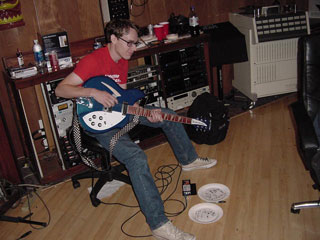
As for vocals, this has been by far the easiest time I've had. We've had to spend less time and the results have been better. I did a couple more first take keepers this time as well, believe it or not. We now have usable lead vox on every song if you count the songs where we're theoretically able to use the demo's lead vocals. There's still a bit of debate on this: I like "Jill" pretty much exactly the way it is, but otherwise, I feel uncomfortable using the vocals I recorded with a handheld SM58 in my apartment when there's a really nice-sounding set-up available. Kevin Army likes something about the spirit and feel, if not always the tone and execution, of the demo vocals of "London," "Disaster's Recipe," and "Big, Strange, Beautiful Hammer." I see what he's saying, but since we're slightly ahead of schedule, I'm probably going to give at least a couple of them a shot. After doing five lead vocal tracks last night, I tried "London," but my voice and concentration were shot by that time, and it didn't work out.
Amped Up Real High
What do you do when the swell little old Fender combo has a blown speaker? Well, you could remove it from the casing, set it on top of a semi-functional AC30 and connect it to its speakers:
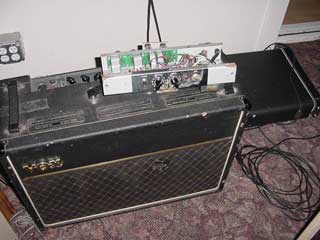
It will sound good. The only drawback: if anyone touches it, they will get electrocuted and die.


